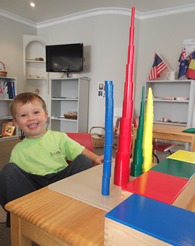Maria
Montessori (1870 - 1952)
Biography
 Maria Montessori was a 20th Century pioneer in education, the
founder of the Montessori approach to education, was born in
Italy in 1870. As a teenager she was determined to become an
engineer, but later abandoned that idea in favour of studying
medicine. Graduating as Italy's first female medical practitioner
she embarked on a career in mental health. Maria Montessori was a 20th Century pioneer in education, the
founder of the Montessori approach to education, was born in
Italy in 1870. As a teenager she was determined to become an
engineer, but later abandoned that idea in favour of studying
medicine. Graduating as Italy's first female medical practitioner
she embarked on a career in mental health.
This brought her into contact with children diagnosed as educationally
subnormal, and excluded from the educational system. She devised
special apparatus to help them learn through movement and achieved
some remarkable results.
Soon, Maria Montessori decided to widen her work to "normal" children.
The extent of her success was such that she realized that if
her method worked so well with deficient children, it would
surely also benefit all children. In 1907, she opened her first
school, Casa de Bambini, in San Lorenzo. Soon, many more schools
opened in Italy, as in other countries, and her work became
known as the "The Montessori Method".
Responding
to demands to explain her 'method' Montessori began to
write about her discoveries and to train people
to work with children the way she advocated. From
this time onward
education became her life and she continued to develop
educational theories to fit what she observed among the
children in her
care.
In 1929, Maria Montessori founded the Association Montessori
Internationale to continue her work. She spent the rest of
her life advocating for children, their rights, and acknowledging
their importance as hope for future world peace.
For the rest of her life she travelled extensively, training,
teaching and lecturing around the world, increasingly convinced
that it was only through effective education
of the rising generation that universal peace could ever become a reality.
She died in Holland in 1952, leaving an international legacy
of Montessori schools
and training centres around the world, all following the Montessori approach,
transcending cultures, faiths, linguistic traditions and political systems.
By the time of her death in 1952, Maria Montessori's recognition
was worldwide.
She obtained numerous awards, and was nominated three times
for the Nobel Peace Prize.
Recommended Reading:
The following books by Dr. Maria Montessori and Dr. Maria
Montessori provide essential background reading.
• The Absorbent Mind
• The Secret of Childhood
• The Discovery of the Child
• The Formation of Man
• To Educate the Human Potential
• Advanced Montessori Method - Book 1
• Education For Human Development
WHAT IS A MONTESSORI EDUCATION?
This is a frequently asked question. Montessori education
is not just an education, it is a philosophy, a way of
thinking that focuses on trust and respect for the child.
A Montessori education provides an enabling environment
that allows children to gain experience learning using
all the senses, including the use of special materials
designed to foster practical skills or refine the senses.
ITS ORIGINS
The Montessori Approach to education developed out of the observations carried
out by Maria Montessori at the beginning of the 20th century in her work with
socially deprived children which she then replicated with children throughout
the world.
HOW THE MONTESSORI APPROACH IS DIFFERENT FROM OTHER EDUCATIONAL
METHODS
The Montessori Approach is underpinned by the essential principle
that learning is inseparable from development, and so education
centres on each child as a unique individual. Children in
Montessori schools become motivated and responsible for their
own learning.
WHAT WOULD YOU SAY WERE THE KEY BENEFITS OF A MONTESSORI
EDUCATION COMPARED TO OTHER EARLY YEARS SETTINGS?
The key benefits of a Montessori education are that it is
an enabling environment that truly follows the child, waiting
for individual signs of readiness towards progress. It fosters
independence and an ability to stay focused which are so
important for starting school. Montessori education has stayed
true to a set of child-centred principles and a core philosophy
for over a century.
Further readings
Montessori Uncovered -
see more (pdf file)
Why
Chose Montessori -
see more (pdf file)
 |
"The child is truly a miraculous being, and
this should be felt deeply by the educator".
(Maria Montessori) |
|
|

